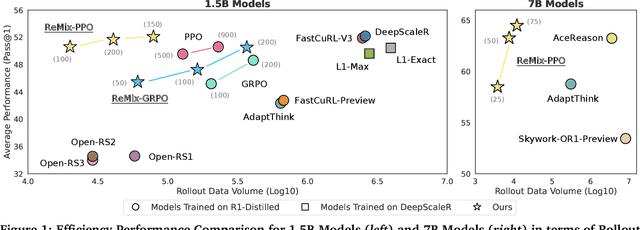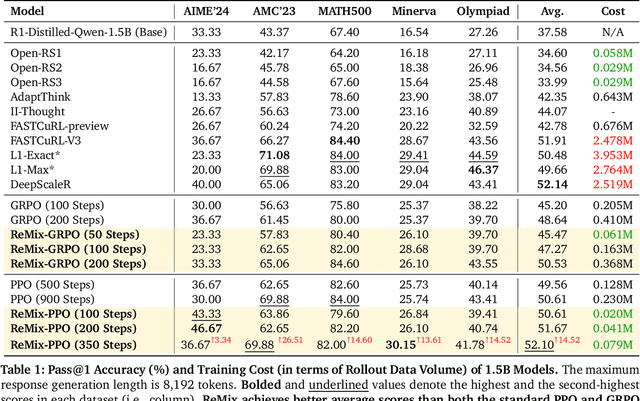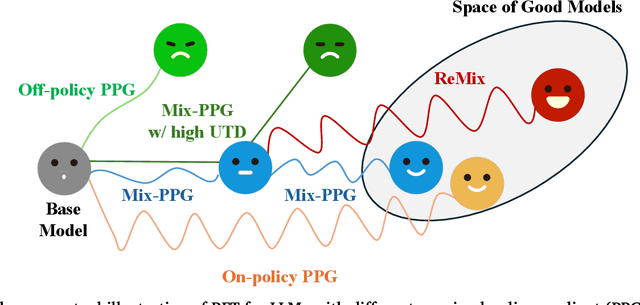Shuyue Hu
LLMRouterBench: A Massive Benchmark and Unified Framework for LLM Routing
Jan 12, 2026Abstract:Large language model (LLM) routing assigns each query to the most suitable model from an ensemble. We introduce LLMRouterBench, a large-scale benchmark and unified framework for LLM routing. It comprises over 400K instances from 21 datasets and 33 models. Moreover, it provides comprehensive metrics for both performance-oriented routing and performance-cost trade-off routing, and integrates 10 representative routing baselines. Using LLMRouterBench, we systematically re-evaluate the field. While confirming strong model complementarity-the central premise of LLM routing-we find that many routing methods exhibit similar performance under unified evaluation, and several recent approaches, including commercial routers, fail to reliably outperform a simple baseline. Meanwhile, a substantial gap remains to the Oracle, driven primarily by persistent model-recall failures. We further show that backbone embedding models have limited impact, that larger ensembles exhibit diminishing returns compared to careful model curation, and that the benchmark also enables latency-aware analysis. All code and data are available at https://github.com/ynulihao/LLMRouterBench.
Beyond Gemini-3-Pro: Revisiting LLM Routing and Aggregation at Scale
Jan 04, 2026Abstract:Large Language Models (LLMs) have rapidly advanced, with Gemini-3-Pro setting a new performance milestone. In this work, we explore collective intelligence as an alternative to monolithic scaling, and demonstrate that open-source LLMs' collaboration can surpass Gemini-3-Pro. We first revisit LLM routing and aggregation at scale and identify three key bottlenecks: (1) current train-free routers are limited by a query-based paradigm focusing solely on textual similarity; (2) recent aggregation methods remain largely static, failing to select appropriate aggregators for different tasks;(3) the complementarity of routing and aggregation remains underutilized. To address these problems, we introduce JiSi, a novel framework designed to release the full potential of LLMs' collaboration through three innovations: (1) Query-Response Mixed Routing capturing both semantic information and problem difficulty; (2) Support-Set-based Aggregator Selection jointly evaluating the aggregation and domain capacity of aggregators; (3) Adaptive Routing-Aggregation Switch dynamically leveraging the advantages of routing and aggregation. Comprehensive experiments on nine benchmarks demonstrate that JiSi can surpass Gemini-3-Pro with only 47% costs by orchestrating ten open-source LLMs, while outperforming mainstream baselines. It suggests that collective intelligence represents a novel path towards Artificial General Intelligence (AGI).
Single-Agent Scaling Fails Multi-Agent Intelligence: Towards Foundation Models with Native Multi-Agent Intelligence
Dec 16, 2025Abstract:Foundation models (FMs) are increasingly assuming the role of the ''brain'' of AI agents. While recent efforts have begun to equip FMs with native single-agent abilities -- such as GUI interaction or integrated tool use -- we argue that the next frontier is endowing FMs with native multi-agent intelligence. We identify four core capabilities of FMs in multi-agent contexts: understanding, planning, efficient communication, and adaptation. Contrary to assumptions about the spontaneous emergence of such abilities, we provide extensive empirical evidence, across 41 large language models and 7 challenging benchmarks, showing that scaling single-agent performance alone does not automatically yield robust multi-agent intelligence. To address this gap, we outline key research directions -- spanning dataset construction, evaluation, training paradigms, and safety considerations -- for building FMs with native multi-agent intelligence.
Learning Compact Representations of LLM Abilities via Item Response Theory
Oct 01, 2025



Abstract:Recent years have witnessed a surge in the number of large language models (LLMs), yet efficiently managing and utilizing these vast resources remains a significant challenge. In this work, we explore how to learn compact representations of LLM abilities that can facilitate downstream tasks, such as model routing and performance prediction on new benchmarks. We frame this problem as estimating the probability that a given model will correctly answer a specific query. Inspired by the item response theory (IRT) in psychometrics, we model this probability as a function of three key factors: (i) the model's multi-skill ability vector, (2) the query's discrimination vector that separates models of differing skills, and (3) the query's difficulty scalar. To learn these parameters jointly, we introduce a Mixture-of-Experts (MoE) network that couples model- and query-level embeddings. Extensive experiments demonstrate that our approach leads to state-of-the-art performance in both model routing and benchmark accuracy prediction. Moreover, analysis validates that the learned parameters encode meaningful, interpretable information about model capabilities and query characteristics.
PerPilot: Personalizing VLM-based Mobile Agents via Memory and Exploration
Aug 25, 2025



Abstract:Vision language model (VLM)-based mobile agents show great potential for assisting users in performing instruction-driven tasks. However, these agents typically struggle with personalized instructions -- those containing ambiguous, user-specific context -- a challenge that has been largely overlooked in previous research. In this paper, we define personalized instructions and introduce PerInstruct, a novel human-annotated dataset covering diverse personalized instructions across various mobile scenarios. Furthermore, given the limited personalization capabilities of existing mobile agents, we propose PerPilot, a plug-and-play framework powered by large language models (LLMs) that enables mobile agents to autonomously perceive, understand, and execute personalized user instructions. PerPilot identifies personalized elements and autonomously completes instructions via two complementary approaches: memory-based retrieval and reasoning-based exploration. Experimental results demonstrate that PerPilot effectively handles personalized tasks with minimal user intervention and progressively improves its performance with continued use, underscoring the importance of personalization-aware reasoning for next-generation mobile agents. The dataset and code are available at: https://github.com/xinwang-nwpu/PerPilot
Beyond GPT-5: Making LLMs Cheaper and Better via Performance-Efficiency Optimized Routing
Aug 18, 2025Abstract:Balancing performance and efficiency is a central challenge in large language model (LLM) advancement. GPT-5 addresses this with test-time routing, dynamically assigning queries to either an efficient or a high-capacity model during inference. In this work, we present Avengers-Pro, a test-time routing framework that ensembles LLMs of varying capacities and efficiencies, providing a unified solution for all performance-efficiency tradeoffs. The Avengers-Pro embeds and clusters incoming queries, then routes each to the most suitable model based on a performance-efficiency score. Across 6 challenging benchmarks and 8 leading models -- including GPT-5-medium, Gemini-2.5-pro, and Claude-opus-4.1 -- Avengers-Pro achieves state-of-the-art results: by varying a performance-efficiency trade-off parameter, it can surpass the strongest single model (GPT-5-medium) by +7% in average accuracy. Moreover, it can match the average accuracy of the strongest single model at 27% lower cost, and reach ~90% of that performance at 63% lower cost. Last but not least, it achieves a Pareto frontier, consistently yielding the highest accuracy for any given cost, and the lowest cost for any given accuracy, among all single models. Code is available at https://github.com/ZhangYiqun018/AvengersPro.
Regret Minimization in Population Network Games: Vanishing Heterogeneity and Convergence to Equilibria
Jul 23, 2025Abstract:Understanding and predicting the behavior of large-scale multi-agents in games remains a fundamental challenge in multi-agent systems. This paper examines the role of heterogeneity in equilibrium formation by analyzing how smooth regret-matching drives a large number of heterogeneous agents with diverse initial policies toward unified behavior. By modeling the system state as a probability distribution of regrets and analyzing its evolution through the continuity equation, we uncover a key phenomenon in diverse multi-agent settings: the variance of the regret distribution diminishes over time, leading to the disappearance of heterogeneity and the emergence of consensus among agents. This universal result enables us to prove convergence to quantal response equilibria in both competitive and cooperative multi-agent settings. Our work advances the theoretical understanding of multi-agent learning and offers a novel perspective on equilibrium selection in diverse game-theoretic scenarios.
Squeeze the Soaked Sponge: Efficient Off-policy Reinforcement Finetuning for Large Language Model
Jul 09, 2025



Abstract:Reinforcement Learning (RL) has demonstrated its potential to improve the reasoning ability of Large Language Models (LLMs). One major limitation of most existing Reinforcement Finetuning (RFT) methods is that they are on-policy RL in nature, i.e., data generated during the past learning process is not fully utilized. This inevitably comes at a significant cost of compute and time, posing a stringent bottleneck on continuing economic and efficient scaling. To this end, we launch the renaissance of off-policy RL and propose Reincarnating Mix-policy Proximal Policy Gradient (ReMix), a general approach to enable on-policy RFT methods like PPO and GRPO to leverage off-policy data. ReMix consists of three major components: (1) Mix-policy proximal policy gradient with an increased Update-To-Data (UTD) ratio for efficient training; (2) KL-Convex policy constraint to balance the trade-off between stability and flexibility; (3) Policy reincarnation to achieve a seamless transition from efficient early-stage learning to steady asymptotic improvement. In our experiments, we train a series of ReMix models upon PPO, GRPO and 1.5B, 7B base models. ReMix shows an average Pass@1 accuracy of 52.10% (for 1.5B model) with 0.079M response rollouts, 350 training steps and achieves 63.27%/64.39% (for 7B model) with 0.007M/0.011M response rollouts, 50/75 training steps, on five math reasoning benchmarks (i.e., AIME'24, AMC'23, Minerva, OlympiadBench, and MATH500). Compared with 15 recent advanced models, ReMix shows SOTA-level performance with an over 30x to 450x reduction in training cost in terms of rollout data volume. In addition, we reveal insightful findings via multifaceted analysis, including the implicit preference for shorter responses due to the Whipping Effect of off-policy discrepancy, the collapse mode of self-reflection behavior under the presence of severe off-policyness, etc.
The Avengers: A Simple Recipe for Uniting Smaller Language Models to Challenge Proprietary Giants
May 26, 2025



Abstract:As proprietary giants increasingly dominate the race for ever-larger language models, a pressing question arises for the open-source community: can smaller models remain competitive across a broad range of tasks? In this paper, we present the Avengers--a simple recipe that effectively leverages the collective intelligence of open-source, smaller language models. Our framework is built upon four lightweight operations: (i) embedding: encode queries using a text embedding model; (ii) clustering: group queries based on their semantic similarity; (iii) scoring: scores each model's performance within each cluster; and (iv) voting: improve outputs via repeated sampling and voting. At inference time, each query is embedded and assigned to its nearest cluster. The top-performing model(s) within that cluster are selected to generate the response using the Self-Consistency or its multi-model variant. Remarkably, with 10 open-source models (~7B parameters each), the Avengers collectively outperforms GPT-4.1 on 10 out of 15 datasets (spanning mathematics, code, logic, knowledge, and affective tasks). In particular, it surpasses GPT-4.1 on mathematics tasks by 18.21% and on code tasks by 7.46%. Furthermore, the Avengers delivers superior out-of-distribution generalization, and remains robust across various embedding models, clustering algorithms, ensemble strategies, and values of its sole parameter--the number of clusters. We have open-sourced the code on GitHub: https://github.com/ZhangYiqun018/Avengers
Decouple and Orthogonalize: A Data-Free Framework for LoRA Merging
May 21, 2025Abstract:With more open-source models available for diverse tasks, model merging has gained attention by combining models into one, reducing training, storage, and inference costs. Current research mainly focuses on model merging for full fine-tuning, overlooking the popular LoRA. However, our empirical analysis reveals that: a) existing merging methods designed for full fine-tuning perform poorly on LoRA; b) LoRA modules show much larger parameter magnitude variance than full fine-tuned weights; c) greater parameter magnitude variance correlates with worse merging performance. Considering that large magnitude variances cause deviations in the distribution of the merged parameters, resulting in information loss and performance degradation, we propose a Decoupled and Orthogonal merging approach(DO-Merging). By separating parameters into magnitude and direction components and merging them independently, we reduce the impact of magnitude differences on the directional alignment of the merged models, thereby preserving task information. Furthermore, we introduce a data-free, layer-wise gradient descent method with orthogonal constraints to mitigate interference during the merging of direction components. We provide theoretical guarantees for both the decoupling and orthogonal components. And we validate through extensive experiments across vision, language, and multi-modal domains that our proposed DO-Merging can achieve significantly higher performance than existing merging methods at a minimal cost. Notably, each component can be flexibly integrated with existing methods, offering near free-lunch improvements across tasks.
 Add to Chrome
Add to Chrome Add to Firefox
Add to Firefox Add to Edge
Add to Edge